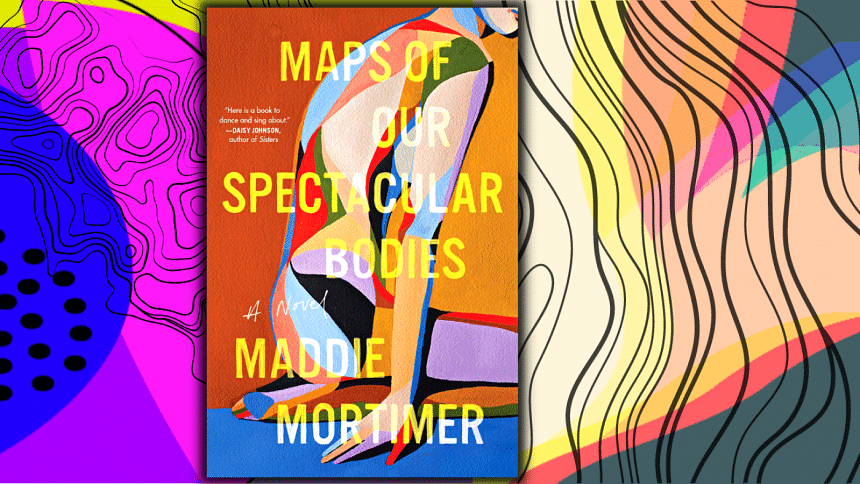Flesh in ruins

"I, itch of ink, think of thing, plucked open at her start; no bigger than a capillary, no wiser than a cantaloupe, and quite optimistic about what my life would come to look like."
The opening sentence of Maddy Mortimer's debut novel, Maps of Our Spectacular Bodies, is sheer poetry—it cascades off the tongue in rhythmic, ornamental verses. In the first moments that I was perusing the book, I had a rather inapt notion about its premise. For a while, I imagined the book taking place in New York, and I was there, watching it unfold over a cup of freshly-brewed coffee.
It does not start in that vein, the book. It takes place in London, a nuclear, happy family the highlight of its restive prose. We accompany the mother, Lia, in the streets. On a dreary, sombre morning, clearing her path among the rush-hour congestion to the doctor's office. Her cancer has resurfaced. After an interval of two years, the tumour is regrowing in the crevice of her body. Only when she had accepted that everything was exactly the manner it ought to be, when life seemed to be lingering again, her nemesis arrived to cut its trip short.
Harry, her pleasant, optimistic husband was fairly alright upon her pronouncement. His ceaseless mantra of "we have done it before and we'll do it again" is recognized in the book as a "burnt shape of hope". Her adolescent daughter, Iris, teetered on the thin line between acceptance and resentment. During one of their word-talks ensuing her diagnosis, Lia had asked Iris how the term Can-cer resonated with her. "It doesn't sound like anything. It sounds flat and cold like a slab of stone."
When cancer arrived, it carried with it very many prayers of friends and foes. Of a mother who was spiteful and of a lover who was lost. It came to Lia baring its claws, clung to a lump of her flesh and prowled. Misery, anguish, loss, guilt—all slithered into her fickle blood. There was an instance where Iris asked her mother why she had not considered raising another child.
"They told me I might get ill again if I had another child."
"But you still got ill again.
So it wasn't worth it. And now I am lonely too."
At another point in the book, her husband said, "But I don't want to be anywhere that you are not."
It is nearly lethal, the value of despair these simple statements hold. It becomes a subject of push and pull for Harry and Iris. Harry with his blatant friendly attraction to a student, Iris with her navigation of juvenility. It manifests in every taunt, every squabble, every minuscule hint of unsolicited jealousy.
We become acquainted with Lia's mother, Anne, too. We receive previous glimpses into Lia's early life as a young girl evolving in a vicarage—an eerie correspondence of her past and Iris' present. It presents motherhood on two sides of the same coin. Maps develops an inception for Iris, while Lia stumbles to her end. When asked in Booker Prizes interview if the book was inspired from her mother's battle with cancer, the author replied, "Parts of the book certainly ended up being just that. But I also wanted to find a space to write about a mother-daughter relationship similar to ours, to preserve some of the magic I felt she passed on, to write of that closeness, and that love."
While there have been multiple stories concerning cancer, and the experiences it involves for the afflicted, Maps of Our Spectacular Bodies is perhaps the first book by an author where they have presented the perception of the disease as well. This unique detail adds a much more intimate and realistic note to the text's creation.
Apart from the depictions of agonising chemotherapy, Lia's loss of her breasts, and the painful prickle in her numb feet, it is also a book where the human body is considered a shrine. Or perhaps, a sin. A plague infested itself in Lia's muscles, and now hers is flesh in ruins. But her flesh was gone long, before the detestation struck, to love and to Matthew, her old lover. It went to him in bits, in all their years of a youthful, illicit affair. It disintegrated amid her tug-of-war with God.
Conceivably, it is the disease that maintains the upper hand in the plot. A jarring voice of its own, the toxins spilling across the pages in bold, chaotic words. What initially seems like a narrative of the disease turns into boldly worded essays becoming more and more obscure with each passing chapter. Ultimately it reads as Lia's conscience. Certain viewers might find the author's abstract style of writing unsettling. At times it speaks of travelling to her thoracic cavity, and at others, there are profound references to Sex and the City.
In reality, the book is a bundle of frayed nerves. There are thousands of wonders sparsed in there, hundreds of things to talk about. But cancer comes and destroys each of them before fruition. Cancer, the unseen protagonist of Maps of Our Spectacular Bodies by Maddie Mortimer. It is daunting how a mere illness can make us lose control over our bodies in a trice, how unsure we can become of our existence due to its malignant presence. We think our body is ours only, but perhaps it is not. Perhaps it is only bound to us through an obligation.
Nur-E-Jannat Alif is a Gender Studies major and part-time writer, who dreams of authoring a book someday. Find her at @literatureinsolitude on Instagram or send her your book/movie/television recommendations at [email protected].

 For all latest news, follow The Daily Star's Google News channel.
For all latest news, follow The Daily Star's Google News channel. 









Comments